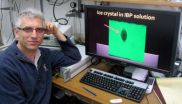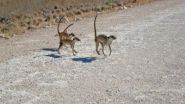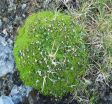(Press-News.org) Jerusalem, February 17, 2013 – If you thought antifreeze was only something that was necessary to keep your car from freezing up in the winter, think again. Plants and animals living in cold climates have natural antifreeze proteins (AFPs) which prevent ice growth and crystallization of organic fluid matter. Without such antifreeze, living matter would suffer from frost damage and even death.
Production of such antifreeze proteins is one of the major evolutionary routes taken by a variety of organisms, including fish, insects, bacteria, plants and fungi. Understanding how this mechanism works is not only significant in itself, but also has important implications for improving the world's food and medicinal production, believe researchers from Israel, Canada and the US who investigated how the process works.
Working on unraveling the AFP enigma were scientists from the lab of Dr. Ido Braslavsky of the Hebrew University of Jerusalem and from Ohio University in the US, in collaboration with Prof. Peter L. Davies from Queens University (Ontario, Canada) and Prof. Alex Groisman from the University of California (San Diego, CA).
Despite half a century of research, the mechanism underlying the activity of the natural antifreeze proteins is still unclear. One of the debates in the academic community regards the chemistry and physics behind the interactions of antifreeze proteins and ice. In particular, there is an ongoing argument over whether the binding of the proteins to ice is reversible and whether continued presence of these proteins in solution is necessary for prevention of ice growth.
The challenge in unraveling these questions stems from a variety of technical problems associated with the growth and tracking of tiny ice crystals in an environment that mimics the surroundings of the antifreeze proteins in nature.
The Hebrew University researchers studied the antifreeze protein of the yellow mealworm. This protein is a hyperactive AFP with a potency to arrest ice growth that is hundreds of times greater than the potency of fish and plant AFPs.
In their study, published in the American journal PNAS (Proceedings of the National Academy of Sciences), the international team of researchers biochemically created a fluorescent marker version of the AFP that allowed for direct observation under a microscope lens. They injected this protein into custom-designed microfluidic devices with minute diameter channels.
The microfluidic devices were placed in cooling units engineered with a temperature control at the level of a few thousandth of a degree, so that ice crystals of 20 to 50 micrometers could be grown and melted controllably, all under microscopic observation.
Using their specialized system, the researchers were able to show that ice grown and incubated in an antifreeze solution remains coated with protein and therefore protected. They further showed that the AFPs bind ice directly and strongly enough so as to prevent the ice from growth even after there is no longer any further presence of protein in the solution.
The significance of the findings published in this study is not only on the scientific level but also practical. For example, fish AFPs are already used in low-fat ice cream to prevent ice recrystallization, thereby maintaining a soft, creamy texture. These proteins could be used in other frozen foods for maintaining the desired texture without additional fats, say the researchers.
In medicine, AFPs can be used to improve the quality of sperm, ovules and embryos stored in a frozen state, and for cold or cyropreservation of organs (freezing at extremely low temperatures) for transplantation. They can also be used in cryosurgery and in agriculture.
Other studies on AFPs focus on preparation of recombinant plants and fish with improved survival rates under cold and dehydration conditions. Such recombinant crops may improve food dispersion over the world, the researchers believe.
INFORMATION:
Not just cars, but living organisms need antifreeze to survive
2013-02-19
ELSE PRESS RELEASES FROM THIS DATE:
Blood is thicker than water -- and blood plasma is, too
2013-02-19
The results are significant because they can help to improve our understanding of medical conditions, such as thrombosis, aneurysms and arteriosclerosis. The research team is publishing its results in Physical Review Letters and the American Physical Society has highlighted the work on its Physics website, placing it on the Focus List of important physics news.
Blood flows differently than water. Anyone who has ever cut themselves knows that blood flows viscously and rather erratically. The similarity between blood and ketchup is something not only filmmakers are aware ...
Researchers in Manchester find genetic key to preventing spine tumors
2013-02-19
Genetic medicine experts from Manchester Biomedical Research Centre at Saint Mary's Hospital and The University of Manchester have identified a new gene responsible for causing an inherited form of tumour, known as spinal meningioma.
Professor Richard Marias, Director of the Paterson Institute
Meningiomas are the commonest form of tumour affecting the brain and spine. Usually meningiomas can be removed by surgery and do not recur. Occasionally people can develop more than one meningioma or many members of the same family can be affected.
A team led by Dr Miriam Smith, ...
Subordinate animals as guinea pigs
2013-02-19
In their environment, wild animals are exposed to countless threats, be they predators, diseases or natural obstacles to get over, such as gorges or rivers. In the course of evolution, they have developed specific behavioural responses to allow them to deal with these risks. In recent times, numerous man-made threats have been added to the naturally-existing ones, such as dangerous roads to cross. On the evolutionary time scale, it is excluded that the animals have evolved a whole new repertoire of adaptive responses to these risks. Simon Townsend is a behavioural biologist ...
Reduced sea ice disturbs balance of greenhouse gases
2013-02-19
The widespread reduction in Arctic sea ice is causing significant changes to the balance of greenhouse gases in the atmosphere. This is shown in a new study conducted by researchers from Lund University in Sweden, among others.
According to the study, the melting of sea ice in the Arctic has a tangible impact on the balance of greenhouse gases in this region, both in terms of uptake and release. The researchers have studied the greenhouse gases carbon dioxide and methane both in the tundra and in the Arctic Ocean.
"Changes in the balance of greenhouse gases can have ...
The criteria for weight-loss surgery need to be changed
2013-02-19
Weight-loss surgery is currently only offered to patients who exceed a certain BMI. However, surgical intervention could improve the health of many more people. This is shown by the Swedish Obese Subjects study carried out at the Sahlgrenska Academy, University of Gothenburg, Sweden, involving 104 patients who were operated on despite their BMI being "too low". As a result, the risk of developing diabetes was reduced by 67 percent.
In order to meet the current selection criteria for weight-loss surgery, Swedish patients must have a body mass index (BMI) above 40 for ...
Cushion plants help other plants survive
2013-02-19
Alpine cushion plants help other plants in harsh mountain environments to survive. This is shown by new research involving researchers from the University of Gothenburg, the results of which are now being publishing in the highly respected journal Ecology Letters.
Cushion plants are a type of plant found in areas such as Arctic environments, and are characterised by their distinctive, round, cushion-like shape.
A new study highlights the strong interaction between cushion plants and other plants in the most severe of mountain environments.
"Cushion plants create additional ...
New projections of 'uneven' global sea-level rise
2013-02-19
Sophisticated computer modelling has shown how sea-level rise over the coming century could affect some regions far more than others. The model shows that parts of the Pacific will see the highest rates of rise while some polar regions will actually experience falls in relative sea levels due to the ways sea, land and ice interact globally.
Reporting in the journal Geophysical Research Letters researchers have looked ahead to the year 2100 to show how ice loss will continue to add to rising sea levels. Scientists have known for some time that sea level rise around the ...
New insight into dogs fear responses to noise
2013-02-19
A study has gained new insight into domestic dogs' fear responses to noises. The behavioural response by dogs to noises can be extreme in nature, distressing for owners and a welfare issue for dogs.
The research by academics from the School of Veterinary Sciences at the University of Bristol, and funded by the RSPCA, is published in Applied Animal Behaviour Science. The study provides an important insight into dogs' fear of noises, and could improve our understanding of behavioural signs of fear or anxiety.
In the study two approaches were taken to investigate the ...
Molecules generated that can halt metastasis of colon cancer
2013-02-19
A Basque research consortium has managed to halt the progress of colon cancer and its metastasis in the liver in an experimental model with mice. This advance, that may open a new path for the future treatment of such pathologies, has been achieved by creating molecules which interfere with the adhesion of tumour cells to other cells of the organism. In this way, the molecules halt both the growth of the tumour and the dissemination of the tumour to and its proliferation in other organs.
The research, published in the prestigious North American Journal of Medicinal Chemistry, ...
CWRU study examines family struggles with anger and forgiveness when relative is dying
2013-02-19
Watching a loved one die tests some family members' relationships with God or the higher being of one's faith. And the spiritual anger and resentment grow with the level of pain and suffering their family member endures, according to researchers at Case Western Reserve University.
Psychologist Julie Exline and palliative care advanced practice nurse Maryjo Prince-Paul surveyed 147 family members with a hospice patient under home care.
More than four of every 10 respondents reported at least some level of anger with God, a major source of which was watching a loved ...



